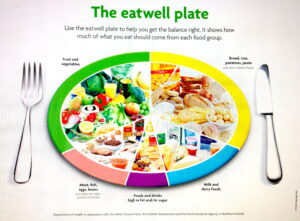
A Simple Guide to Healthy Nutrition
Are you at your ideal weight or striving to reach your weight goal? Is good health achieved simply by burning more calories than you take in? The answer, I would suggest, is no!
Overall health improvement must be factored into the equation as well as weight management. Otherwise, you could be heading for problems. Correct nutrition can help reduce the risk of a multitude of health-related problems such as diabetes, heart disease and some cancers.
Proper nutrition is not just a case of counting calories. The best diets offer balanced nutrition that promote the reduction of bad cholesterol, maintenance of good blood pressure, and helps with weight control. This is achieved by eating a variety of foods, monitoring the ratio of food types as well as counting calories.
To function properly, your body must have the correct combination of nutrients:
Carbohydrates. They are the primary source of fuel in your diet. The body uses carbohydrates to build glucose which can be used immediately or stored in your body for later. Too much glucose, however, is stored as fat. There are two types of carbohydrates – simple and complex. Sugars are simple carbohydrates whereas starch and fibre are classed as complex carbohydrates.
Proteins. Proteins help your body build and maintain muscles and other tissues. They also function in the creation of hormones. Like carbohydrates, excess protein is stored as fat. Animal and vegetable are the two major types of proteins.
Fat. Strange as it may seem; fat is another nutrient your body requires. It comes in both saturated and unsaturated forms. Saturated fat puts you at risk of health problems. Unsaturated fat is healthy, but if it goes through any type of refinement process, it can become unhealthy fat known as trans-fats.
Vitamins. These are also required nutrients. Different vitamins perform different tasks within the body. They can work with the metabolism to help with energy levels. It has also been noted that certain vitamins can help prevent disease. For example, vitamins A, C, and E, also called antioxidants, can assist with the prevention of coronary artery disease by keeping build up from occurring on artery walls. Vitamin B-1 is needed for digestion and proper nervous system function. Vitamin B-2 is needed for normal cell growth. Vitamin B-3 helps to detoxify your body. Folic acid assists with production of red blood cells. Vitamin D assists with the absorption of calcium.
Minerals and trace elements. These are other nutrients your body requires. Both are used in many different body processes. Minerals like chlorine help make your digestive juices. Phosphorus helps build strong bones. Both can be found in the foods we consume, but with a trace element, your body just needs a tiny amount. Salt is one another nutrient your body requires.
You should follow several guidelines to create a well-balanced, nutritional diet.
- Fruit & Vegetables. This should account for around one third of our daily intake. When making your selections for each day, be sure to choose a good variety, eating as many different colours as possible, this will help you to select from all the
- Grains/Breads & Cereals. This should also account for around one third of our daily intake and should consist of mainly whole grains.
- Milk & Dairy. Although essential, this group should be kept to a minimum at around one tenth of our daily intake.
- Meat & Alternatives. This should account for around one to two tenths of our daily intake.
- Fats & Sugars. This group should account for the smallest proportion of our daily intake and viewed as an ‘occasional’. Most of the fats you consume should be in the form of unsaturated fats, as saturated fats and trans-fats can damage your health.

Excellent nutrition is the basis of a healthy diet. If you want help achieving your optimum health, contact me HERE
